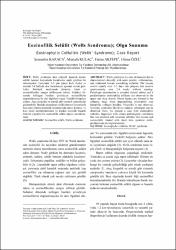Siprofloksasin kullanımı ile oluşan edinsel uzun QT sendromu
Abstract
Hayatı tehdit eden ventriküler aritmilere sebep
olabilen uzun QT sendromu doğumsal veya edinsel nedenlere
bağlı olarak ortaya çıkabilmektedir. Günümüzde yaygın
olarak kullanılmakta olan histamin 1 (H-1) reseptör
antagonistleri ve florokinolon grubu antibiyotikler de
edinsel uzun QT sendromuna neden olabilen ilaç gruplarındandır.
Florokinolon grubu antibiyotikler doz bağımlı
olarak gecikmiş düzenleyici potasyum akımının hızlı bile-
şenini bloke ederler ve bu etkileri ile QT mesafesinde
uzamaya ve torsades de pointes’e (TdP) neden olabilirler.
Bu grup antibiyotiklerden olan siprofloksasinin de nadir
de olsa QT mesafesini uzatabildiği ve TdP’ye neden olabildiği
bilinmektedir ve bu etkisi diğer kinolonlarla kıyaslandığında
daha nadir gözlenmektedir. Bizim olgumuzda
da hem H-1 reseptör antagonisti olan hidroksizin hem de
florokinolon grubu bir antibiyotik olan siprofloksasin kullanmaktayken
edinsel uzun QT sendromu oluşmuştur. The long QT syndrome which can cause
life threaten ventricular arrhythmias should be constituted
due to congenital and acquired reasons. The histamine-1
(H-1) receptor antagonists and fluoroquinolone group antibiotics
which are using frequently today are the members
of drug groups that can cause acquired long QT syndrome.
Fluoroquinolone group antibiotics blockade the fast component
of delayed regulator potassium flow depend on
dose and by this effect they can lengthen QT interval and
can cause torsades de pointes (TdP). Ciprofloxacin, a
member of this antibiotic group should lengthen QT interval
and cause TdP rarely and this effects of ciprofloxacin
are less common comparing with other quinolones. Acquired
long QT syndrome appeared in our case while she
was taking both hydroxyzine which is an H-1 receptor antagonist
and cip
Source
Afyon Kocatepe Üniversitesi, Kocatepe Tıp DergisiVolume
6Issue
2Collections
- Makaleler [452]



















